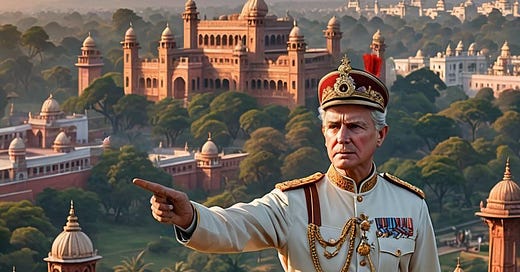Three years after India had been dragged into World War Two, Gandhi and the Indian National Congress had had enough. A proposal was made: if the British did not agree to immediately withdraw from India, the Congress would launch a mass movement of non-cooperation. At an assembly meeting on August 8, 1942, after a strong vote in favor of the resolution, Gandhi gave a speech summing up their demand to the British: Quit India!
Actually, Gandhi gave two speeches: first in Hindi, then one in English for the benefit of the foreign press who were observing. For the broader audience, he flattered the viceroy and their friendship; complimented British tolerance in electing an Indian member to Parliament in 1892; and reminisced about his dear Christian friend Charlie Andrews. As he often did, Gandhi included some gentle criticisms to spark reflection and self-improvement.
I do not regard England, or for that matter America, as free countries. They are free after their own fashion, free to hold in bondage the coloured races of the earth. Are England and America fighting for the liberty of these races today? You shall not limit my concept of freedom.1
The resolution had passed overwhelmingly, but not unanimously. When Gandhi spoke in Hindi, he complimented the thirteen dissenters for their courage in holding fast to their convictions. He knew, Gandhi reminded them, what it was like to be “in a hopeless minority.”2
Much of this speech revolved around another minority: Muslims in India. M.A. Jinnah, leader of the Muslim League was advocating for creating a separate nation, Pakistan (“Land of the pure”). Gandhi described this as vivisection and appealed to the memory of Hindu-Muslim unity after World War One. Peace was possible… but Jinnah’s intransigence would ultimately result in the partition of India in 1947.
Unwittingly, the Quit India movement contributed to Jinnah achieving the necessary political power to make his demand stick. On August 9, the British came down hard on Indian National Congress, arresting all the leaders and holding them until the final days of the war. Non-cooperation still took place: Congress boycotted legislative elections, thus allowing the Muslim League to fill the power vaccum and integrate themselves with the British.
Sacrifice was the thrust of Gandhi’s Quit India speech. “Here is a mantra,” he told the audience. “‘Do or Die.’ We shall either free India or die in the attempt.” Finally, on August 15, 1947, the British did quit India… but that’s another story.
When have you demanded someone stop some sort of behavior?
Collected Works of Mahatma Gandhi (Speech at A.I.C.C. meeting, August 8, 1942) p. 39,967
Ibid. p. 39,953



